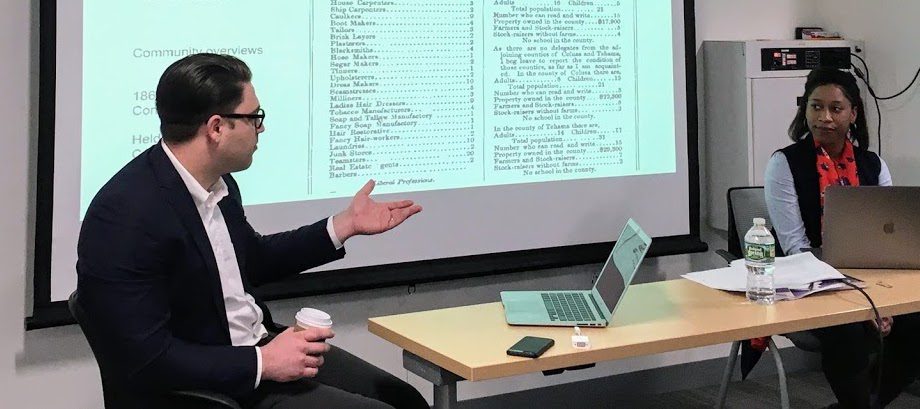By Sarah Payne
On Friday, April 13, the NULab welcomed Sarah Lynn Patterson and Jim Casey, national co-directors of the Colored Conventions Project (CCP), which is based at the University of Delaware. Starting in the fall, Patterson is an assistant professor in the English department at UMass Amherst and Casey is a postdoctoral research associate at the Center for Digital Humanities at Princeton. The CCP recovers Black men’s and women’s political organizing from the 1830s until the 1890s. These individuals came together at national and state level meetings, called “Colored Conventions” to advocate for their rights including citizenship, safety, education, labor rights, and legal justice. The surviving meeting proceedings, newspaper coverage, and petitions provide a fertile ground for understanding and recovering Black political activism during the nineteenth century. While many of the delegates to the meetings were prominent African-American men, ranging from writers and editors to church leaders and entrepreneurs, the role of Black women in the conventions is less well-documented, and women are less evident in the transcribed minutes. One current goal of the CCP is to ensure that, despite this imbalance in representation, the important roles that black women played are visible in research based on the collection.

Patterson and Casey’s talk, “Black Collectives, Black Data, and Public Imperatives,” combined a two-part lecture, a Q&A session, and an interactive component in which attendees could transcribe various documents from the Freedmen’s Bureau Papers. They began the talk by asking the audience to think about data, collectives, and collaborative labor and what happens when we collaborate on projects we couldn’t do individually. Patterson and Casey cited predecessors that have been influential to the CCP, particularly work by women of color such as the Combahee River Collective Statement (1977), Transform DH, and the Crunk Feminist Collective. They made sure to emphasize the substantive DH work that has been done by people of color, which remains underrepresented at many DH conferences, and they shared a list: “Black Digital Humanities Projects and Resources.” Additionally, they stressed the importance of remaining accountable to non-academic communities while working on projects such as these. Patterson and Casey highlighted several key tenets of radical collectives, which they use as a working model: resisting traditional leadership structures and moving beyond academic rank, viewing communities as sites of activist training, focusing on communities’ intellectual rituals and traditions, and recognizing activism as an intellectual endeavor.
The talk then pivoted to the Douglass Day Transcribe-a-thon held on February 14, 2018, Frederick Douglass’s 200th birthday. Participants in the event assisted in transcribing documents from the Freedmen’s Bureau Papers. The nearly 2 million image files are housed at the Smithsonian Transcription Center and volunteers can access and participate in transcribing the documents. Those present at the NULab talk were also given the opportunity to transcribe some of the documents, which elicited questions about interpretation and knowledge production, as one attempts to decipher handwriting and present it in a new form. Ultimately, Patterson and Casey emphasized the importance of community accountability and the need to treat subject invisibility as a research endeavor. Just because someone or something is not visible doesn’t mean it’s not there or that it is undeserving of further study.
For lecture slides, including links to the resources discussed by Patterson and Casey, see here.



